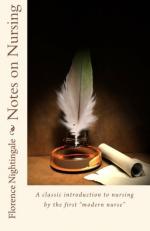Now the medical man who sees the patient only once a day or even only once or twice a week, cannot possibly tell this without the assistance of the patient himself, or of those who are in constant observation on the patient. The utmost the medical man can tell is whether the patient is weaker or stronger at this visit than he was at the last visit. I should therefore say that incomparably the most important office of the nurse, after she has taken care of the patient’s air, is to take care to observe the effect of his food, and report it to the medical attendant.
It is quite incalculable the good that would certainly come from such sound and close observation in this almost neglected branch of nursing, or the help it would give to the medical man.
[Sidenote: Tea and coffee.]
A great deal too much against tea[2] is said by wise people, and a great deal too much of tea is given to the sick by foolish people. When you see the natural and almost universal craving in English sick for their “tea,” you cannot but feel that nature knows what she is about. But a little tea or coffee restores them quite as much as a great deal, and a great deal of tea and especially of coffee impairs the little power of digestion they have. Yet a nurse, because she sees how one or two cups of tea or coffee restores her patient, thinks that three or four cups will do twice as much. This is not the case at all; it is however certain that there is nothing yet discovered which is a substitute to the English patient for his cup of tea; he can take it when he can take nothing else, and he often can’t take anything else if he has it not. I should be very glad if any of the abusers of tea would point out what to give to an English patient after a sleepless night, instead of tea. If you give it at 5 or 6 o’clock in the morning, he may even sometimes fall asleep after it, and get perhaps his only two or three hours’ sleep during the twenty-four. At the same time you never should give tea or coffee to the sick, as a rule, after 5 o’clock in the afternoon. Sleeplessness in the early night is from excitement generally and is increased by tea or coffee; sleeplessness which continues to the early morning is from exhaustion often, and is relieved by tea. The only English patients I have ever known refuse tea, have been typhus cases, and the first sign of their getting better was their craving again for tea. In general, the dry and dirty tongue always prefers tea to coffee, and will quite decline milk, unless with tea. Coffee is a better restorative than tea, but a greater impairer of the digestion. Let the patient’s taste decide. You will say that, in cases of great thirst, the patient’s craving decides that it will drink a great deal of tea, and that you cannot help it. But in these cases be sure that the patient requires diluents for quite other purposes than quenching the thirst; he wants a great deal of some drink, not only of tea, and the doctor will order what he is to have, barley water or lemonade, or soda water and milk, as the case may be.




